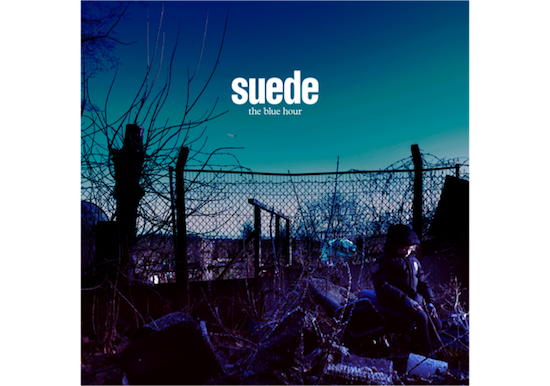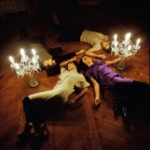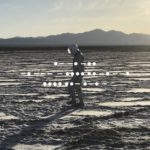The Blue Hour, Suede’s eighth album (and the third since their miraculous resurrection) sees these committed urbanites abandon the flyovers, the tower blocks and the nuclear skies for the countryside. But if you think that they’ve gone soft and retreated to some pastoral idyll, you’re in for a shock – for this is a countryside of roadkill, of mysterious chalk circles, where parents desperately cry out for their missing children and where escapees from the city go to end it all. It’s that grubby hinterland on the outside of town, not quite the city any more but not yet fully rural, a land of shabby outbuildings and ‘close-knit’ communities, but The Blue Hour – with its Omen choirs, ominous organs, swelling orchestral strings, and lavish, over-the-top arrangements that make Dog Man Star sound like a collection of 4-track demos – is as much Hammer Horror as Blair Witch or The Hills Have Eyes. It’s a HUGE, frequently ridiculous record, utterly lacking in self-consciousness or irony. And it’s fantastic.
There’s a loose narrative here, a story of some unspecified horror that lurks just outside our awareness – possibly involving abducted children, witchcraft, mysterious burials (“What are you doing daddy?” “Burying.” “What?” “You know what.”) – and on first listen you find the concept gets in the way of some of the best songs of Suede’s career; a couple more listens in and it becomes clear that each song is a piece of the jigsaw, of a story that begins with a child being led away as his parents scream his name, and ends with a bag being dumped on a hard shoulder. Songs are delivered from the standpoint of the child and the abductor, and you quickly realise that the album’s most uplifting moments – and there are many – are little more than false hope.
So ‘Wastelands’ (surely Suede can’t have got this far without recording a song called ‘Wastelands’?) and ‘Beyond the Outskirts’ begin as ‘Wild Ones’-style anthems of defiance and escape, before dissolving into noise and horror (“Where the wind is in our face, and our veins are opened…”) ‘Life is Golden’, classic Suede from its swaggering guitars to its joyous chorus, turns out to be the voice of the abductor (“And they won’t love you tonight…”), whilst the similarly anthemic ‘Don’t Be Afraid if Nobody Loves You’ begins with the sound of a desperate parental search party and just gets worse (“I’ll take you to where no one goes, and no one ever leaves”).
And there is no happy ending. ‘Dead Bird’ has Anderson burying something in front of his son which, whatever it is, we can be pretty sure isn’t a bird. ‘All the Wild Places’, this album’s big showstopper of a ballad, comes off all romantic then hits you with “There was another, but we won’t see her again…” And the seven-minute finale ‘Flytipping’ finds Anderson “With a bag in our hands…just by the hard shoulder” – a bag of what is never actually specified – before a huge, orchestral climax swells around him, a ‘Still Life’ with corpses.
In its conceit, its ambition, its willingness to frequently open itself up to ridicule, The Blue Hour is a towering, frightening, squalid and inspirational work of art. Is it as good as Dog Man Star? Or rather, is Dog Man Star as good as The Blue Hour? Who cares – let’s just marvel at the fact that the same band actually pulled off both, some 24 years apart.




